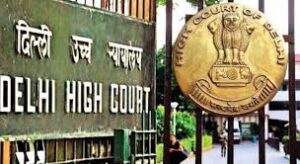Delhi High Court Criticizes Government’s Handling of MCD School Supplies Amidst Legal Challenges

Credit: India Legal
Certainly! Here’s a revised version of the article:
27.04.2024: The Delhi High Court recently voiced strong concerns over the handling of educational supplies in MCD schools, criticizing the Delhi government’s priorities amidst Chief Minister Arvind Kejriwal’s ongoing legal challenges. The court remarked that the government’s focus on power dynamics seems to supersede the broader national interest, highlighting a clash between political and educational imperatives.
In response to allegations of stalled educational initiatives due to administrative hurdles, the Aam Aadmi Party (AAP) pointed fingers at the non-formation of the MCD’s standing committee, attributing the delay to legal disputes overseen by the Supreme Court. The party accused the Lieutenant Governor (LG) of appointing aldermen illegally, preventing the establishment of crucial decision-making bodies within the MCD.
The court’s rebuke came amidst discussions on the delay in approving essential educational materials, citing Kejriwal’s incarceration related to a financial case as a factor hindering necessary approvals. Justices Manmohan and Manmeet P S Arora expressed disappointment at the perceived prioritization of political maneuvers over the welfare of students.
The bench criticized the government’s pursuit of power, questioning the necessity of further authority grabs when existing responsibilities remain unfulfilled. They emphasized the need for inclusive leadership and condemned actions that exacerbate administrative paralysis.
In response, the government assured the court of resolving the supply issues upon formal requests from the MCD commissioner, signaling a willingness to address the educational shortcomings.
The court’s scrutiny stemmed from a PIL filed by NGO Social Jurist, underscoring the dire consequences of delayed supplies and services for students in MCD schools. The absence of a functioning standing committee had created a bureaucratic gridlock, leading to disruptions in essential services like book distributions and facility maintenance.
The court’s impassioned remarks underscored the urgency of addressing these systemic deficiencies, urging swift resolutions and empathetic governance towards the educational needs of the populace. The ongoing legal saga reflects broader challenges in balancing political agendas with essential public services, highlighting the need for collaborative and effective governance.
From – NDTV

